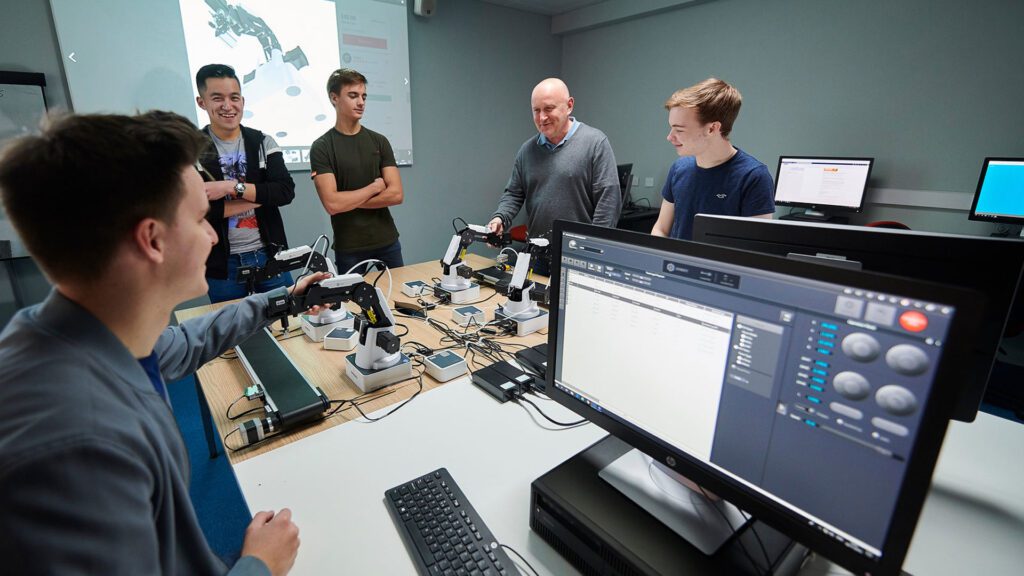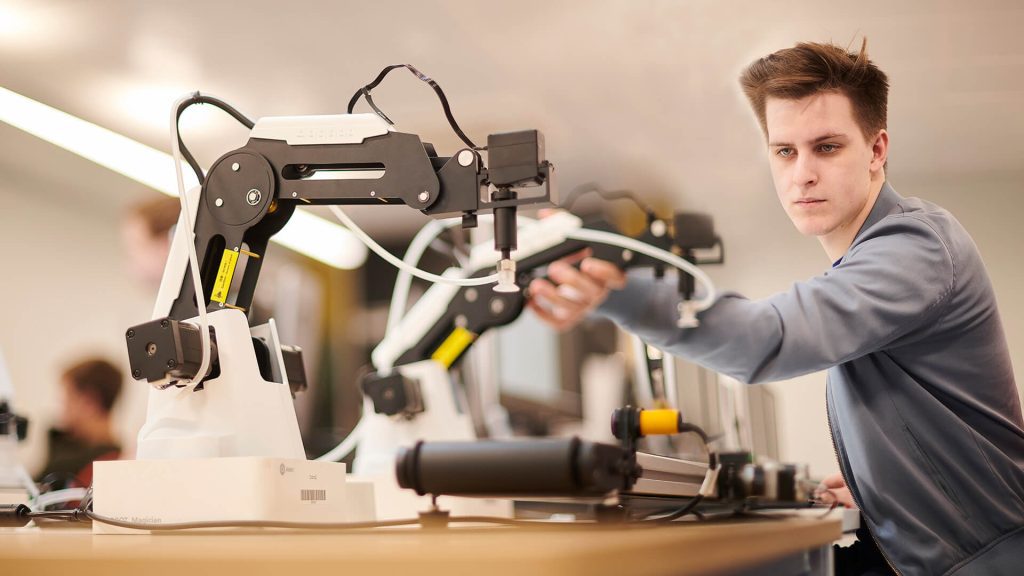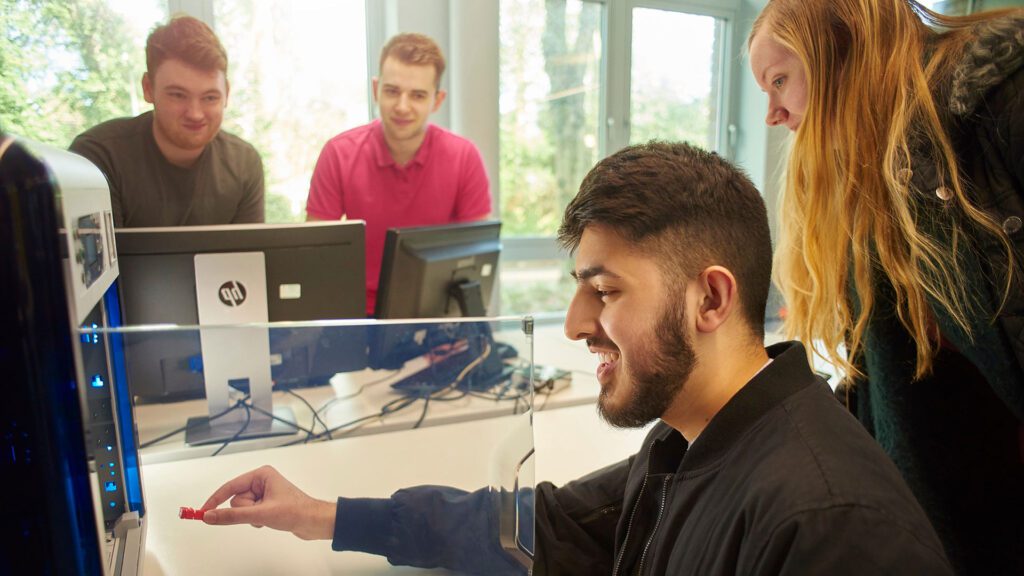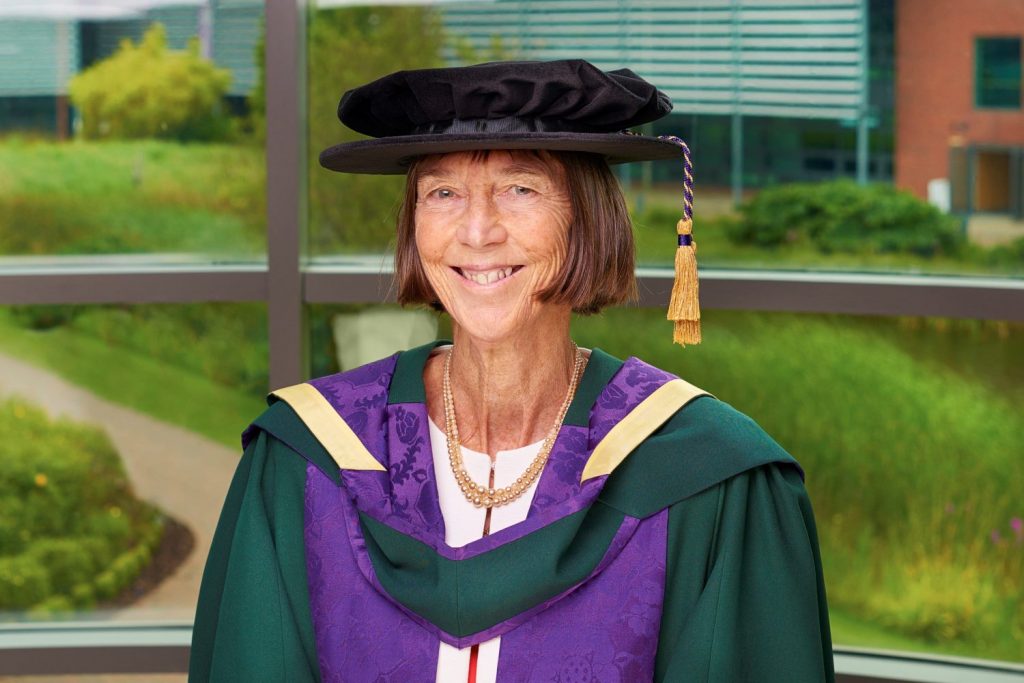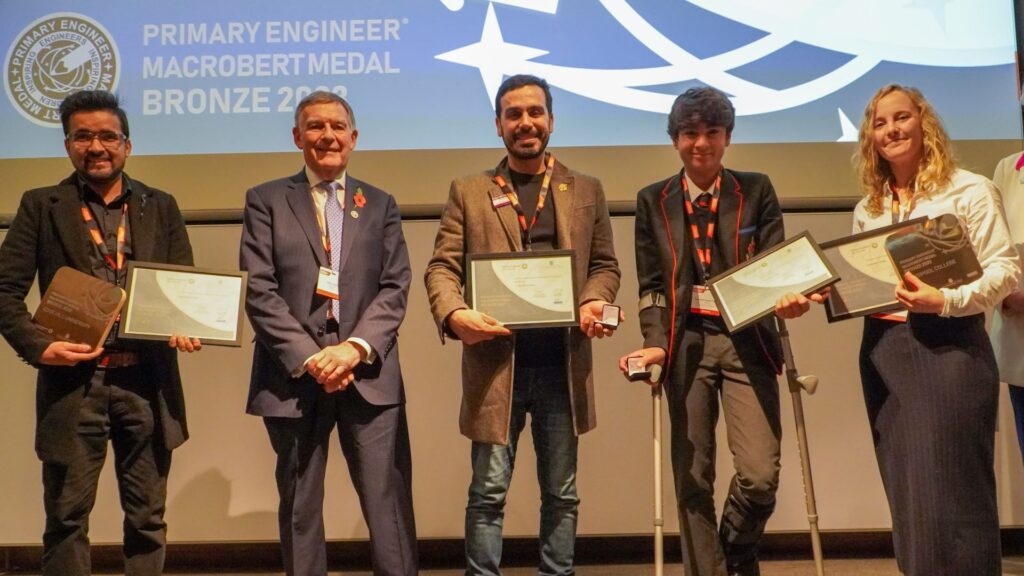Electrical and Electronic Engineering MEng (Hons)
UCAS code: H612
Discover how to tackle problems, great and small. Immerse yourself into a world of possibility and creative thinking. Develop your confidence and skills to achieve your potential on this integrated Masters degree.
Overview
| Course length: | 4 years full-time |
|---|---|
| Start dates: | September 2024 September 2025 |
| Location: | Edge Hill University |
| Example offers: | BBC-ABB (A Level) or DMM-DDM (BTEC) View full entry criteria |
| Subject(s): | Engineering and Physics |
| Faculty: | Arts and Sciences |
| Department: | Engineering |
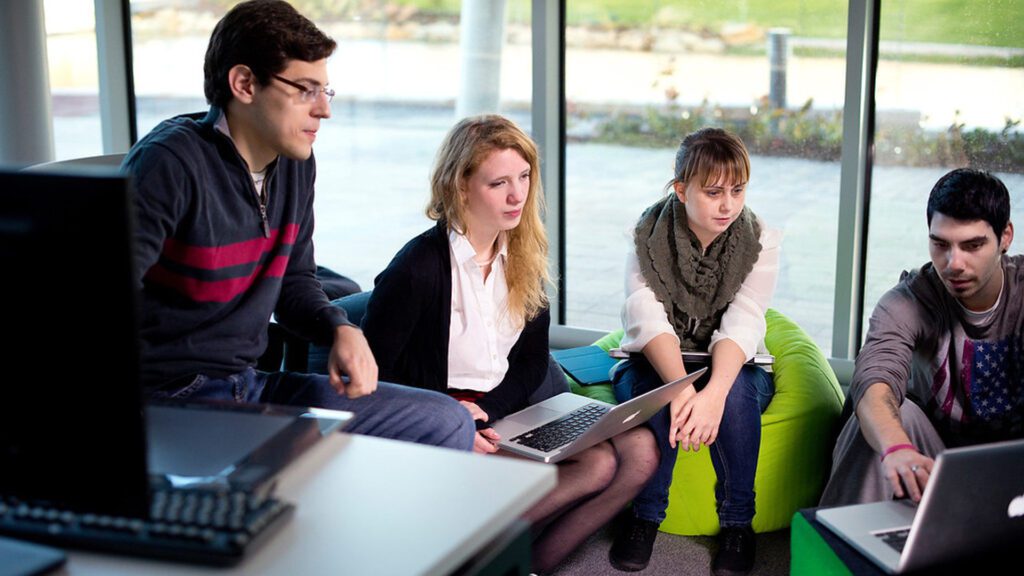
Electrical and electronic engineering is equally rewarding and challenging. Our MEng Electrical & Electronic Engineering degree will provide you with an exciting challenge. And we’ll support you to succeed. With the integrated Masters, the degree will set you up for future senior and specialist jobs.
We’ll provide you with in-depth training. You’ll learn about a vast array of electrical and electronic engineering principles. These include contemporary electrical and electronic systems, power delivery mechanisms and architectures, computer-aided engineering and applied industrial engineering. Our dedicated teaching staff will support you each step of the way.
Your unique skill set will enable you to explore roles in different parts of the world. You’ll also gain the satisfaction of seeing the real impact of your work, with opportunities like collaborative engineering projects to build your experience and teamwork skills.
Course features
-
International students can apply
-
Sandwich year option available
-
Studying abroad option available
What you'll study
In the first year of the electrical and electronic engineering course, you will train in core engineering principles. We’ll teach you how to design, analyse, and construct. You’ll get to grips with key theories that will help you succeed on the rest of the course. You’ll uncover digital circuitry and logic, computation and programming, and mathematical principles.
Your second year will ground you in more specialist modules. These will include Power Electronics, Antennas and Radio Wave Propagation, Signal Processing, Control Systems and Instrument Engineering. You’ll engage in group project work and deliver real products. We’ll also encourage you to start thinking about taking a 12-month work placement. Experiencing the world of work will expand your knowledge. It’ll also make you a more attractive candidate to employers.
Your third year will take you into a deeper understanding of the subject. You’ll investigate electrical motors, power drivers, and advanced control. You’ll also sharpen your engineering management and enterprise expertise. Project work will expand your knowledge and experience and help you transition from student to professional. Our Multidisciplinary Group Design Project module will be key to achieving this.
The emphasis of your final year is on independent study and learning. Your research and development project will be central to this. It’ll develop your project management skills and may focus on either hardware or software. You’ll also develop a deeper understanding of topics covering power generation and distribution, and mobile communication systems.
How you'll study
Teaching methods are designed in consultation with leading employers in the region. Many classes are based in engineering and computing laboratories, focusing on student activity as a means of learning. We introduce theoretical concepts by building on concrete practical activity.
Classes are highly interactive, with practical application of concepts a key factor, as well as cases drawn from real-life. Workshops, seminars, group tutorials and practical exercises provide opportunities for you to work with your peers and develop the essential people skills to complement your technical ability.
You will be required to attend up to four days a week.
How you'll be assessed
You will be assessed through a combination of practical exercises, reports, essays, presentations and examinations. We want you to develop the ability to work effectively both independently and as part of a team, therefore assessment includes both of these forms, though the emphasis is strongly on individual work.
Who will be teaching you
You will be taught by staff who are passionate about student learning and development, while also benefitting from guest lectures delivered by industry experts. The programme team are specialists in engineering and computing and are active researchers. Their research feeds directly into the teaching of the programme, ensuring that you will learn about the latest developments within subjects while gaining the skills and knowledge required to meet industrial needs.
Academic staff are also regular contributors to conferences and journals, frequently engaging with the wider business and academic environment in disseminating knowledge and delivering impact.
Entry criteria
Entry requirements
Typical offer 112-128 UCAS Tariff points. This must include A Level Mathematics at Grade C or above or equivalent. GCSE English Language at Grade C or Grade 4 or above, or equivalent, is also required.
For students studying BTEC a BTEC Extended Diploma in Engineering is preferred. Typical offers will be DMM, with grade Merit or above in one of the following units:
- to solve engineering problems
- engineering mathematics
Example offers
| Qualification | Requirement |
|---|---|
| A Level | BBC-ABB. |
| BTEC Extended Diploma (or combination of BTEC QCF qualifications) | Distinction, Merit, Merit (DMM). |
| T Level | Overall grade of Merit. |
| International Baccalaureate (IB) | We are happy to accept IB qualifications which achieve the required number of UCAS Tariff points. |
| Access to Higher Education Diploma | 45 credits at Level 3, for example 15 credits at Distinction and 30 credits at Merit, 24 credits at Distinction and 21 credits at Merit, or 30 credits at Distinction and 15 credits at Merit. The required total can be attained from various credit combinations. |
Please note, the above examples may differ from actual offers made. A combination of A Level and BTEC awards may also be accepted.
If you have a minimum of two A Levels (or equivalent), there is no maximum number of qualifications that we will accept UCAS points from. This includes additional qualifications such as Extended Project Qualification (EPQ), AS Levels that haven't been continued to A Level, and General Studies AS or A Level awards.
English language requirements
International students require IELTS 6.0, with a score no lower than 5.5 in each individual component, or an equivalent English language qualification.
If your current level of English is half a band, one band, or one-and-a-half bands lower, either overall or in one or two elements, you may want to consider our Pre-Sessional English course.
How to apply
Apply full-time
Read our guide to applying through UCAS to find out more about the application process.
International
Please see our international student pages for further information about how to apply as a prospective international student.
Should you accept an offer of a place to study with us and formally enrol as a student, you will be subject to the provisions of the regulations, rules, codes, conditions and policies which apply to our students. These are available at www.edgehill.ac.uk/studentterms.
If you join a full time undergraduate degree at Edge Hill University, we will guarantee you the offer of a room in our halls of residence for the first year of your course.
Discover our accommodation
Facilities
The Department of Engineering is based in the state-of-the-art £13m Tech Hub. This purpose-built development offers highly contemporary suites of outstanding facilities for Engineering and Physics, as well as Computing and IT students. Our modern engineering teaching laboratories are equipped with a range of industry-standard, test and measurement equipment, and leading analytical software. 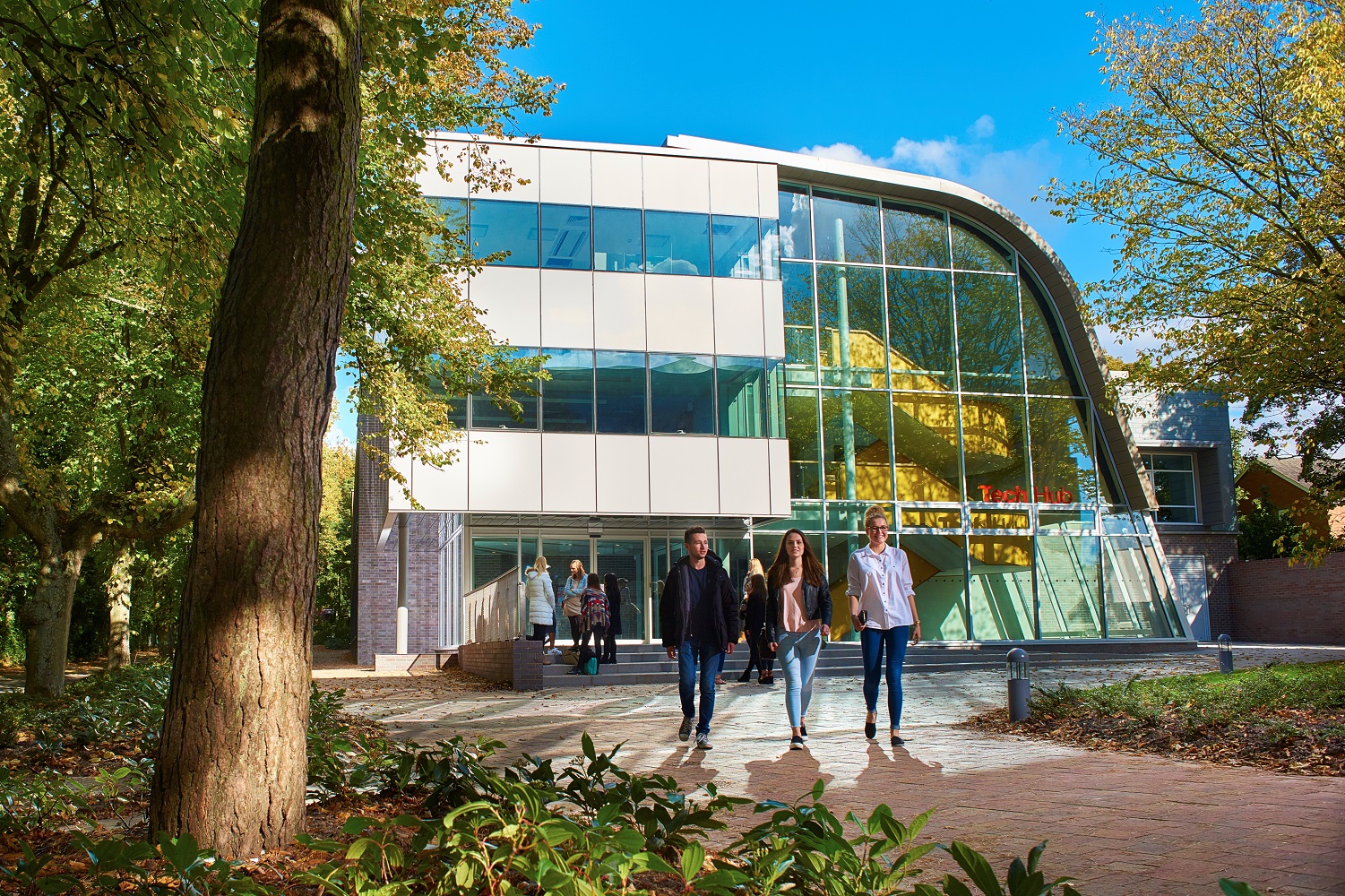
There are dedicated specialist laboratories for materials engineering, electrical motors, and electronic engineering, in addition to an abundance of computer facilities and a large, horseshoe-shaped Harvard style lecture theatre.
Where you'll study
Tech Hub
Learning resources
Learning resources include oscilloscopes, signal generators, digital multimeters, Arduino and Raspberry Pi microprocessors, a tensile tester machine, electronics training kits, single and 3-phase transformers, a 3-D printer, and robotic arm kits, plus MATLAB and SolidWorks software platforms.
Teaching and learning are supported by the web-based platform Blackboard Ultra Virtual learning Environment. The library is well-stocked with recommended print books and e-books and subscribes to high-impact technical e-Journals. The university subscribes to LinkedIn Learning, which provides free and unlimited access to thousands of high-quality online courses and video tutorials written by industry experts.
Assistive and accessible technologies include Read&Write text to speech software, Caption Ed to facilitate ease of note taking, and a mind mapping tool. The university provides specific workshops on academic skills for students who have specific learning difficulty or disability.
Finance
Tuition fees
UK Full-Time
£9,250
a year
International
£16,500
a year
EU/EEA and Swiss students who have settled or pre-settled status under the EU Settlement Scheme, as well as Irish nationals, may be eligible for the UK tuition fee rate.
Financial support
Subject to eligibility, UK students joining this course can apply for a Tuition Fee Loan from the Government to cover the full cost of tuition fees. UK students enrolling on the course may also be eligible to apply for additional funding to help with living costs.
Please view the relevant Money Matters guide for comprehensive information about the financial support available to eligible UK students.
EU/EEA and Swiss students who have settled or pre-settled status under the EU Settlement Scheme may be eligible to apply for financial support. Irish nationals can ordinarily apply to Student Universal Support Ireland (SUSI). If you are an EU student who does not have settled or pre-settled status, or are an international student from a non-EU country, please see our international student finance pages.
Your future career
As an electrical and electronic engineering graduate, your technical skills will be in-demand across different industries globally. Whether you work on electric vehicles, renewable energy, or manufacturing, you’ll bring your advanced knowledge to real-world situations.
As a highly skilled graduate with a MEng Electrical and Electronic Engineering degree, you might work in roles such as:
- Automotive Engineer
- Medical Equipment Engineer
- Power Engineer
- Product Design Engineer
- Space Engineer
- Systems Design Engineer
But you won’t just finish with an undergraduate degree, you’ll have a Masters too. You’ll have even more career options to choose from, and graduating from your MEng degree will open the door for you to pursue further study and research, such as a PhD. Many students go on to complete a postgraduate research degree in an engineering-related subject.
Your transferable skills will also make you an attractive prospect for other industries such as financial management and accountancy. Our dedicated Employability team provide you with ongoing support during internships and placements.
Course changes
Every effort has been made to ensure the accuracy of this information, however our courses are subject to ongoing review and development. Changing circumstances may necessitate alteration to, or the cancellation of, courses.
Changes may be necessary to comply with the requirements of professional bodies, revisions to subject benchmarks statements, to keep courses updated and contemporary, or as a result of student feedback. We reserve the right to make variations if we consider such action to be necessary or in the best interests of students.
